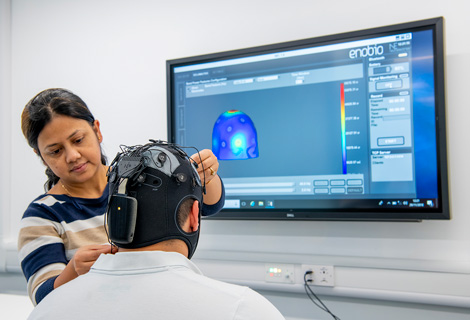
Multi-million pound investment to keep Southampton at the forefront of Computer Science and Artificial Intelligence
The University of Southampton is investing millions of pounds in Computer Science and Artificial Intelligence (AI) to retain and enhance its international reputation for teaching and research.
The ambitious expansion of staff and facilities is timed with the 75th anniversary of its renowned School of Electronics and Computer Science (ECS).
ECS is a leading university department of its kind in the UK. Throughout its rich history, from pioneering work on radio engineering in the 1940s to UK Government recognition of our cyber security expertise 70 years later, ECS achievements have been transforming the world, defining and developing new areas of research and inspiring generations of students.
In the year that the UK Government launched its first National Artificial Intelligence (AI) Strategy, this strategic investment will lay the foundations at Southampton for an ever brighter future by making key appointments across seven research areas, growing the number and quality of students, and building new laboratories alongside enhanced digital learning.
The School’s plans include an additional £1.7m to increase staff by 24 accademic posts over the next three years, £1.4m for a new research laboratory in robotics and AI, and a major capital investment in teaching facilities. The expansion will shape new research areas that change our world for the better and develop new teaching programmes that will be available by 2023/24.
Professor Mark E. Smith, President and Vice-Chancellor, says: “Southampton is renowned for offering a first-rate education in an exceptional research environment, but we do not merely rest on our history and past successes. This bold expansion of staff and facilities in Electronics and Computer Science will place Southampton at the cutting-edge of AI teaching and research long into the future, delivering our mission to change the world for the better.”
Professor Paul Lewin, Head of ECS, says: “We wish to grow a School for the future, developing new research activities and educational programmes that continue to make the highest quality contributions to science and engineering in an increasingly uncertain world facing significant global challenges.
“The scale of investment is significant, and our ambition is to grow the number of academic staff in Computer Science by 50 percent. Artificial Intelligence will be fundamental to our future world and this major investment in staff and laboratories will ensure that we remain at the forefront of this revolution.”
The commitment includes a computer laboratory for up to 300 undergraduate and postgraduate students for teaching, laboratory/project work and online assessment activities. The plan also includes adjacent space for AI research laboratories to cement the research-led teaching aspects of degree programmes.
ECS at Southampton’s core strengths lie in its combination of expertise across both electronics and computer science. The interdisciplinary nature of its research have driven many areas that are internationally leading, with strong industrial links delivering vast real-world impact. The School is home to a Centre for Health Technologies, Centre for Machine Intelligence and Centre for Internet of Things and Pervasive Systems, and leads the UK’s Trustworthy Autonomous Systems Hub.
The strategic investment will create a critical mass in AI at Southampton by recruiting across seven research themes: Automation and Robotics, Computer Engineering, Digital Health, Human-centred AI, Human-Systems Interaction, Machine Learning, and Theoretical Computer Science and Software Engineering.
Find out more about current opportunities for Associate Professors/Professors and Lecturers on the ECS recruitment microsite.